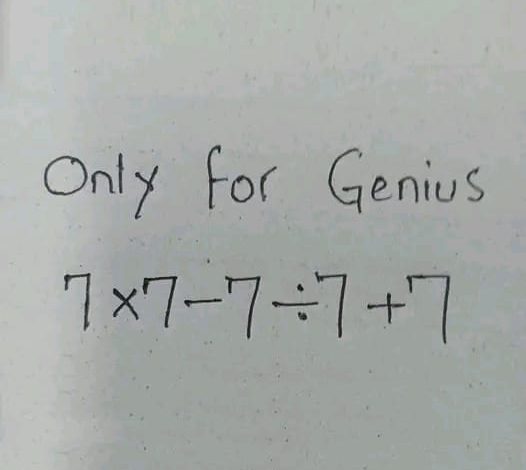The Role of Mathematical Puzzles in Cognitive Development

ADVERTISEMENT
The Role of Mathematical Puzzles in Cognitive Development
Introduction
he puzzle presented, “7 x 7 – 7 ÷ 7 + 7,” invites participants to apply basic arithmetic operations and order of operations to find the correct solution. Such puzzles stimulate mental activity and encourage a deeper understanding of mathematical concepts.
Presentation
The equation in question combines multiplication, division, subtraction, and addition, all centered around the number seven. To solve it correctly, one must adhere to the mathematical principle known as the order of operations, often abbreviated as PEMDAS (Parentheses, Exponents, Multiplication and Division (from left to right), Addition and Subtraction (from left to right)). This principle dictates that operations should be performed in a specific order to ensure a consistent and correct result.
The solution unfolds as follows:
- Multiplication first: 7 x 7 = 49
- Division next: 49 – (7 ÷ 7) = 49 – 1 = 48
- Addition last: 48 + 7 = 55
Thus, the answer to the puzzle is 55. Engaging with such puzzles develops not only specific mathematical skills but also enhances general cognitive abilities like memory, concentration, and speed of processing. They are excellent for training the brain to manage complex thoughts and tasks efficiently.
Conclusion
Mathematical puzzles like “7 x 7 – 7 ÷ 7 + 7” offer more than just a correct answer; they provide a pathway to enhanced cognitive development and quicker problem-solving skills. Regular engagement with such activities can improve one’s ability to think logically and systematically, proving invaluable in academic and professional settings. Moreover, these puzzles foster a fun and stimulating way to engage with mathematics, making them accessible and enjoyable for learners of all ages. By embracing these challenges, individuals can nurture a lifelong appreciation for math and its practical applications in everyday life.
ADVERTISEMENT




